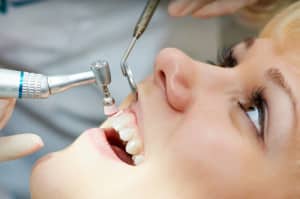 Even if you are diligent with your oral hygiene at home you shouldn’t skip your regular dental checkups and professional cleanings. You attend your dental checkups twice a year to prevent dental diseases, decay, or other problems from developing. For most people, two checkups per year are sufficient, but if you have diabetes, are at risk for periodontal disease, or have other special concerns your dentist may recommend more frequent visits. When was your last checkup and cleaning?
Even if you are diligent with your oral hygiene at home you shouldn’t skip your regular dental checkups and professional cleanings. You attend your dental checkups twice a year to prevent dental diseases, decay, or other problems from developing. For most people, two checkups per year are sufficient, but if you have diabetes, are at risk for periodontal disease, or have other special concerns your dentist may recommend more frequent visits. When was your last checkup and cleaning?
After A Tooth Extraction
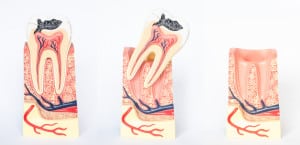 Tooth extractions are usually easy and quick. Your dentist will give you an injection of a local anesthetic to numb the area and then remove the tooth. Simple, right? In the majority of cases it is that simple, but once in a while there may be a complication, and the most common complication after an extraction is dry socket. Strange name? Not when you learn what it is. Let’s talk about why you might develop dry socket after a tooth extraction.
Tooth extractions are usually easy and quick. Your dentist will give you an injection of a local anesthetic to numb the area and then remove the tooth. Simple, right? In the majority of cases it is that simple, but once in a while there may be a complication, and the most common complication after an extraction is dry socket. Strange name? Not when you learn what it is. Let’s talk about why you might develop dry socket after a tooth extraction.
(more…)
Why A Bridge May Be Right For You
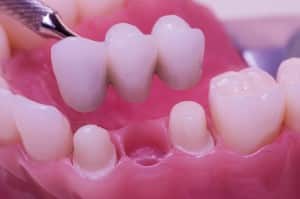 Implants, dentures, bridges…there are plenty of treatments available if you have a missing tooth, but how do you know which one is right for you? Your dentist will discuss the many options, pros and cons, and cost of each treatment while helping you decide. Implants involve a costly and complex procedure. Dentures can accommodate several missing teeth or edentulism (complete tooth loss). But what if you only have one or two missing teeth? In that case a dental bridge may be right for you.
Implants, dentures, bridges…there are plenty of treatments available if you have a missing tooth, but how do you know which one is right for you? Your dentist will discuss the many options, pros and cons, and cost of each treatment while helping you decide. Implants involve a costly and complex procedure. Dentures can accommodate several missing teeth or edentulism (complete tooth loss). But what if you only have one or two missing teeth? In that case a dental bridge may be right for you.
Dental Veneers And Lumineers
H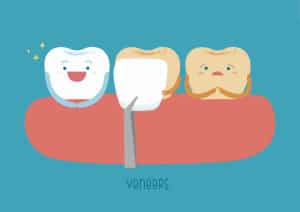 ave you noticed your teeth lately? Sure you brush them twice a day, but have you really noticed them? How do they look? Worn? Stained? Your smile can make you look older or younger, and we all prefer to look younger. If your smile is aging you and you’re looking for an easy fix, you might consider looking into dental veneers or Lumineers. Although Lumineers are less invasive, easier, and reversible, both treatments can give you a brand new smile. Keep reading to find out more about dental veneers and Lumineers.
ave you noticed your teeth lately? Sure you brush them twice a day, but have you really noticed them? How do they look? Worn? Stained? Your smile can make you look older or younger, and we all prefer to look younger. If your smile is aging you and you’re looking for an easy fix, you might consider looking into dental veneers or Lumineers. Although Lumineers are less invasive, easier, and reversible, both treatments can give you a brand new smile. Keep reading to find out more about dental veneers and Lumineers.
In Case Of Emergency Call…Pecan Tree Dental
 Wouldn’t it be nice if there were no such things as accidents or emergencies? If you went through life worrying about emergencies and accidents every day you would be a basket case! You can’t control what is going to happen each day, but there is one thing that can give you a sense of security…knowing someone will be there when you need them. At Pecan Tree Dental we are here if you need us during a dental emergency. Even if you have never been here before we will accommodate your needs. Although you don’t like to think about it, and you hope the need never arises, emergencies can happen. In case of emergency call…Pecan Tree Dental.
Wouldn’t it be nice if there were no such things as accidents or emergencies? If you went through life worrying about emergencies and accidents every day you would be a basket case! You can’t control what is going to happen each day, but there is one thing that can give you a sense of security…knowing someone will be there when you need them. At Pecan Tree Dental we are here if you need us during a dental emergency. Even if you have never been here before we will accommodate your needs. Although you don’t like to think about it, and you hope the need never arises, emergencies can happen. In case of emergency call…Pecan Tree Dental.
Types Of Mouth Guards And Their Uses
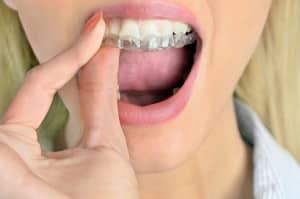 Mouth Guards are used to protect your teeth from injury. There are different types of mouth guards for different uses. Most mouth guards are used to protect from sports injuries or bruxing (grinding and clenching your teeth). Mouth guards can be bought over-the-counter but your dentist can design a custom-fit one. To be most effective mouth protectors should fit precisely and comfortably. They should resist damage, be easy to clean, and be durable. Most mouth guards are designed only to cover the top teeth but under special circumstances (i.e. braces) the dentist might include a guard for your bottom teeth as well. Read on to find out more about the types of mouth guards and their uses.
Mouth Guards are used to protect your teeth from injury. There are different types of mouth guards for different uses. Most mouth guards are used to protect from sports injuries or bruxing (grinding and clenching your teeth). Mouth guards can be bought over-the-counter but your dentist can design a custom-fit one. To be most effective mouth protectors should fit precisely and comfortably. They should resist damage, be easy to clean, and be durable. Most mouth guards are designed only to cover the top teeth but under special circumstances (i.e. braces) the dentist might include a guard for your bottom teeth as well. Read on to find out more about the types of mouth guards and their uses.
(more…)
What Are You Putting In Your Mouth?
 Toothpaste as we know it (in tubes) was invented in the 1890s, but toothpaste has existed since 5000BC, even before toothbrushes were invented. Throughout history toothpastes were made with all sorts of unpalatable ingredients such as crushed bones, burnt eggshells, powdered charcoal, and ox hooves’ ashes. Yuk. Imagine putting those in your mouth. Today toothpaste is made with all sorts of things too. What are you putting in your mouth?
Toothpaste as we know it (in tubes) was invented in the 1890s, but toothpaste has existed since 5000BC, even before toothbrushes were invented. Throughout history toothpastes were made with all sorts of unpalatable ingredients such as crushed bones, burnt eggshells, powdered charcoal, and ox hooves’ ashes. Yuk. Imagine putting those in your mouth. Today toothpaste is made with all sorts of things too. What are you putting in your mouth?
What’s In Your Mouthwash?
 Gone are the days when there were only one or two types of toothbrushes, toothpaste, or mouthwash. Today the isles are full of different brands of oral hygiene products, and numerous varieties within each brand. It can be confusing to say the least, and who has the time to debate which ones are the best? As they say, knowledge is power, so it never hurts to know the ingredients in the products you are using, and knowing the ingredients can help you make better choices. Do you know what’s in your mouthwash?
Gone are the days when there were only one or two types of toothbrushes, toothpaste, or mouthwash. Today the isles are full of different brands of oral hygiene products, and numerous varieties within each brand. It can be confusing to say the least, and who has the time to debate which ones are the best? As they say, knowledge is power, so it never hurts to know the ingredients in the products you are using, and knowing the ingredients can help you make better choices. Do you know what’s in your mouthwash?
Breaking News: Milk Is High In Sugar
 Milk has always been hailed as being good for your teeth because it contains calcium. Calcium helps strengthen your tooth enamel which protects your teeth against injury and decay. Your whole body needs calcium for bone strength and to help certain systems function properly, so milk is definitely good for you, but did you know that one serving of milk can have anywhere from 9 to 14 grams of sugar? Yup, milk is high in sugar, so how can it be good for your teeth?
Milk has always been hailed as being good for your teeth because it contains calcium. Calcium helps strengthen your tooth enamel which protects your teeth against injury and decay. Your whole body needs calcium for bone strength and to help certain systems function properly, so milk is definitely good for you, but did you know that one serving of milk can have anywhere from 9 to 14 grams of sugar? Yup, milk is high in sugar, so how can it be good for your teeth?
Types Of Dental Crowns And Their Uses
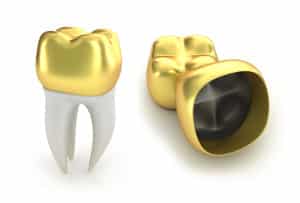 Dental crowns are a common treatment for decayed or damaged teeth that still have enough tooth structure to save. Placing a dental crown is not a complex or difficult procedure and does not require surgery as a dental implant would. There are different types of dental crowns. Each type has advantages and disadvantages. If you are considering a crown, there are a number of factors to be taken into account before making a decision as to what type of crown to choose. Knowing the types of dental crowns available and their uses can be very helpful.
Dental crowns are a common treatment for decayed or damaged teeth that still have enough tooth structure to save. Placing a dental crown is not a complex or difficult procedure and does not require surgery as a dental implant would. There are different types of dental crowns. Each type has advantages and disadvantages. If you are considering a crown, there are a number of factors to be taken into account before making a decision as to what type of crown to choose. Knowing the types of dental crowns available and their uses can be very helpful.







